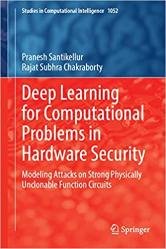 Название: Deep Learning for Computational Problems in Hardware Security: Modeling Attacks on Strong Physically Unclonable Function Circuits
Название: Deep Learning for Computational Problems in Hardware Security: Modeling Attacks on Strong Physically Unclonable Function CircuitsАвтор: Pranesh Santikellur, Rajat Subhra Chakraborty
Издательство: Springer
Серия: Studies in Computational Intelligence
Год: 2023
Язык: английский
Формат: pdf (true), epub
Размер: 10.2 MB
The book discusses a broad overview of traditional Machine Learning (ML) methods and state-of-the-art Deep Learning (DL) practices for hardware security applications, in particular the techniques of launching potent "modeling attacks" on Physically Unclonable Function (PUF) circuits, which are promising hardware security primitives. The volume is self-contained and includes a comprehensive background on PUF circuits, and the necessary mathematical foundation of traditional and advanced Machine Learning techniques such as support vector machines, logistic regression, neural networks, and Deep Learning. This book can be used as a self-learning resource for researchers and practitioners of hardware security, and will also be suitable for graduate-level courses on hardware security and application of Machine Learning in hardware security. A stand-out feature of the book is the availability of reference software code and datasets to replicate the experiments described in the book.
Depending on the dataset and the kind of problem statement, machine learning can be divided into three categories: supervised learning, unsupervised learning, and reinforcement learning.
1) Supervised learning: In supervised learning, the ML model is trained under supervision, i.e., the actual output guides the expected output of the model at each step of the training process.
2) Unsupervised learning: The objective of unsupervised learning can be to discover the underlying pattern in an unlabeled dataset. Contrary to supervised learning, which aims to make right predictions for the new data, unsupervised learning seeks to glean insight from the unlabeled data. Anomaly detection and recommendation systems are popular applications of unsupervised learning.
3) Reinforcement learning: Reinforcement learning (RL) is an entirely different paradigm compared to supervised and unsupervised algorithms. RL is based on the idea of learning by interacting with the environment. The goal of the RL problem is to map situations to actions so as to maximize the numerical reward. RL is also synonymous with the natural method of learning.
Contents:
1. Introduction to Machine Learning for Hardware Security
2. Physically Unclonable Functions
3. Machine-Learning Basics
4. Modeling Attacks on PUF
5. Improved Modeling Attack on PUFs based on Tensor Regression Network
6. Combinational Logic-Based Implementation of PUF
7. Conclusion
Скачать Deep Learning for Computational Problems in Hardware Security